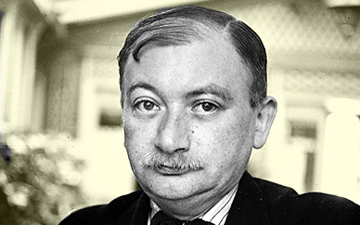
It has been said that Joseph Roth and Stefan Zweig are a study in opposites: whereas Zweig was “a careful, calculating literary bourgeois” whose lucrative biographies of historical figures allowed him to reside, for a time, in a castle outside of Salzburg, Roth was a itinerant alcoholic (he started drinking heavily at age eight) who lived out of two suitcases and shuttled between six different cities. Nonetheless, Zweig supported Roth (both professionally and financially) for a good portion of his later life, and the two maintained a very close friendship. Below, Roth writes to Zweig, complaining of financial strain, his wife, and the coming holiday season.
TO STEFAN ZWEIG
November 26, 1935, Paris
Dear friend,
Mr. Sabatier has just written to tell me Grasset will take my novel, so long as de Lange’s conditions aren’t too steep.—Now I hear the Sabatier is leaving Grasset, and going to Albin Michel.
Thank you very much for interceding in the thing just now coming about. Probably you’re thinking of a type of publisher that could help me. Please God I’ll be saved.
Dear friend, if you don’t come till January, I fear you’ll only find me half alive. The Christmas holidays in particular I will NOT be able to survive. You can have no idea how much I dread them. My whole tribe of Negroes is descending on me, perversely and needlessly decked out with German Christmas trees and Aryan sentiments. There is nothing I hate so much as the smell of pine sap on an empty wallet, when I don’t even have small change with which to take myself to a restaurant. It’s physically impossible for me to survive that without being autonomous. Even surviving until then, without money, is impossible. I have 200 francs a week for myself till 23 December. I suffer the plagues of Egypt if my wife cannot go to the cinema. I must be free in the evening, I must be alone, and alone with a clear conscience. In that woman—as in all of them—there is the deadly and perfectly natural urge to constrain me, to make me into a sort of family pet, and the only way I can protect myself from that with a clear conscience is if I provide for her in some sort. Without a clear conscience, I cannot go and be free. My sufferings would be redoubled.
There’s no point, my dear friend, all my strength is frittered away in this pettiness. I spend three-quarters of my day on foolish things, ridiculous worries, there is no one, far and wide, who could free me of so much as a telephone conversation. Nor do I even want my wife to do it. Everything would then be presented to me one day as “work,” “deserving,” and so forth. I do not want someone to cook, or type or phone for me; save me from services. They will all come home to roost one day. I must be as autonomous as a pasha in his harem. I don’t pay with sex, or by the acceptance of so-called services. I don’t care.
I wish a higher force would free me, so that…
+
FURTHER READING
For an interesting essay by Michael Hoffman on compiling and translating Roth’s letters, click here.


